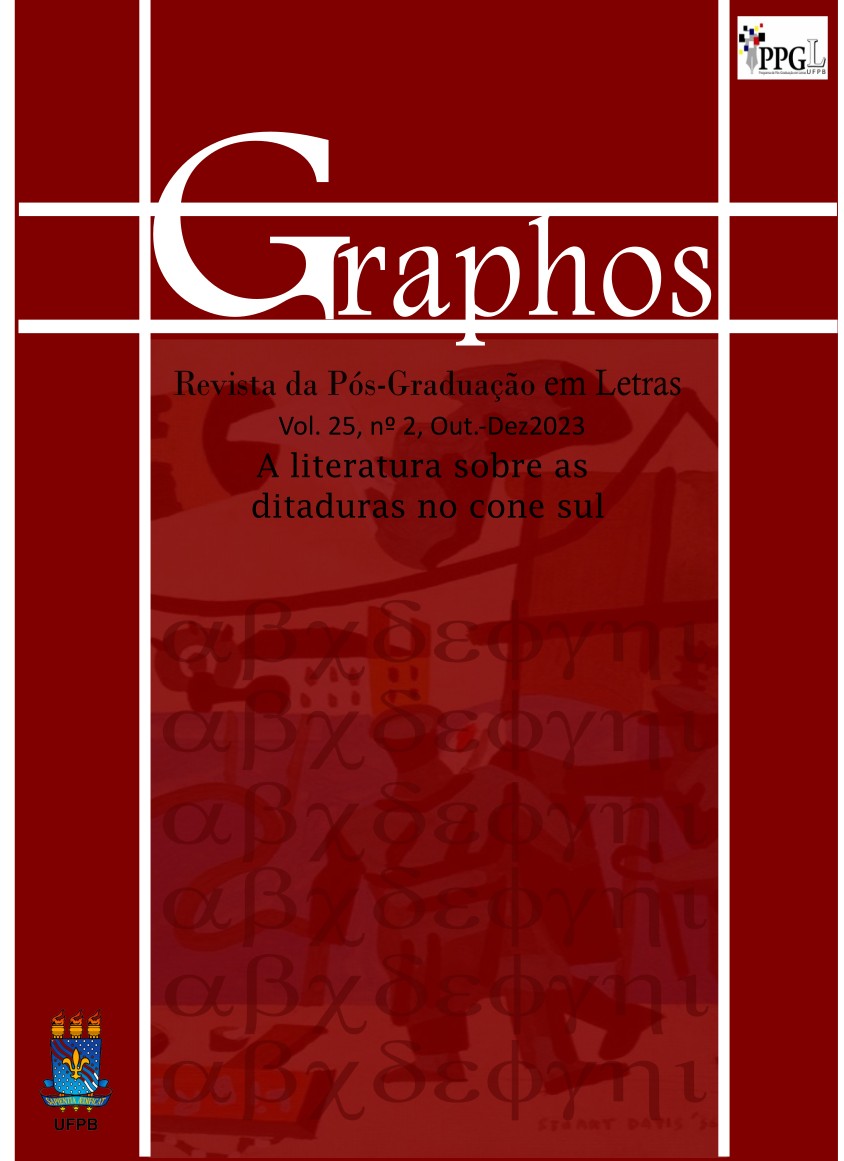THE POST-DICTATORSHIP LITERATURE IN ARGENTINA:
SETTING INTERSECTIONS IN SOY UN BRAVO PILOTO DE LA NUEVA CHINA
DOI:
https://doi.org/10.22478/ufpb.1516-1536.2023v25n2.66425Keywords:
Memory and literature; literature and dictatorship; post-dictatorship literature; autofiction in Latin-American novel; contemporary Argentine literature.Abstract
There are many ways of thinking about the aesthetic and critical possibilities which focus on the boundaries between reality and fiction, history and literature. In this research, I present an analysis of Ernesto Semán’s novel, Soy un bravo piloto de la Nueva China (2011), by making use of concepts such as realidadficción and literatura en sicro y en fusión theorized by Josefina Ludmer (2010). These concepts help to understand some artifices used in contemporary literature which subvert a traditional view of the setting (space and time), given that the aforementioned book is structured in three parts with specific treatments for each of the narrative spheres and with distinct points of view and setting (spaces and times). It then presents how individual and collective memories unfold in the last Argentine civic-military dictatorship, in which the conflicts of the narrator-protagonist stand out in their similarity and difference with the author (both sons of militants of the dictatorship) and how this autofictional feature adds value to the novel within the Argentine literary system. The theoretical line is developed in the light of Elizabeth Jelin (2002), Pilar Calveiro (2013) and Marienne Hirsch (2015). It is observed in the study how Semán updates the theme of the Argentine dictatorship from the standpoint of children of disappeared/detained parents, cultivating the work of constant memory from both the perspective of a new generation and the ethical/aesthetic needs of the contemporary.
Downloads
References
ALBUQUERQUE, Thays Keylla de. Nos fios da memória latino-americana: narrativas da pós-ditadura na Argentina, no Brasil e no Chile. Recife: UFPE, 2020. Tese (Doutorado em Letras. Teoria da Literatura). Disponível em: https://repositorio.ufpe.br/handle/123456789/39381 Acesso em: 22 de maio 2021.
ARENDT, Hannah. Eichmann em Jerusalém. Tradução José Rubens Siqueira. São Paulo: Companhia das Letras, 1999.
ASSMANN, Aleida. Espaços da Recordação: formas e transformações da memória cultural. Tradução de Paulo Soethe. Campinas: Editora da Unicamp, 2011.
BENEDETTI, Mario. Pedro y el Capitán. Buenos Aires: Editorial Sudamericana, 2000.
BLEJMAR, Jordana. Copyright de la memoria, autoficción y novela familiar en Soy un bravo piloto de la nueva China.IN: Revista de Análisis Cultural Kamchatka (Universidad de Valencia). Disponível em: http://www.academia.edu/19550238/Copyright_de_la_memoria_autoficci%C3%B3n_y_novela_familiar_en_Soy_un_bravo_piloto_de_la_nueva_China?auto=download. Acesso em: 14 dez. 2018.
CALVEIRO, Pilar. Política y/o violencia: una aproximación a la guerrilla de los años setenta. Buenos Aires: Siglo Veintiuno, 2013.
ESPACIO MEMORIA Y DERECHOS HUMANOS [EX ESMA]. Donde hubo muerte, hoy hay vida. Buenos Aires: Espacio Memoria y Derechos Humanos [Ex Esma], 2016.
GÓMEZ, Leticia. El concepto de posmemoria en tres novelas argentinas recientes. 2014. Disponível em: http://ojs.ub.gu.se/ojs/index.php/modernasprak/article/viewFile/2877/2491. Acesso em: 6 nov. 2018.
HIRSCH, Marienne. La Generación de la posmemoria. Escritura y cultura visual después del Holocausto. Madrid: Carpe Noctem, 2015.
JELIN, Elizabeth. Los trabajos de la memoria. Madrid: Siglo Veintiuno Editores, 2002.
KEHL, Maria Rita. Tortura e Sintoma Social. In: TELES, Edson; SAFATLE, Vladimir. (Orgs.). O que resta da ditadura? A exceção brasileira. São Paulo: Boitempo, 2010.
LUDMER, Josefina. Notas para Literaturas Posautónomas III. Blog da Autora. Jul. 2010. Disponível em: https://josefinaludmer.wordpress.com/2010/07/31/notas-para-literaturas-posautonomas-iii/. Acesso em: 21 out. 2019.
REALES, Liliana; CONFORTIN, Rogério de Souza. Introdução aos estudos da narrativa. Florianópolis: LLE/CCE/UFSC, 2008.
RICOEUR, Paul. A memória, a história, o esquecimento. Tradução de Alain François et.al. Campinas: Editora da UNICAMP, 2007.
ROBIN, Régine. A memória saturada. Tradução de Cristiana Dias e Greciely Costa. Campinas: Editora da UNICAMP, 2016.
SEMÁN, Ernesto. Soy un bravo piloto de la nueva China. Buenos Aires: Mondadori, 2011.
Downloads
Published
Issue
Section
License
Copyright (c) 2023 Thays Albuquerque

This work is licensed under a Creative Commons Attribution 4.0 International License.







